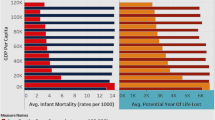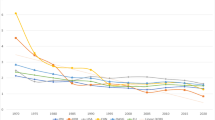Abstract
Both the rhetoric of human capital and the information society are based on the idea of continuous progress. The politics of European governments rest on a simplified presumption that to produce more and higher educational credentials is the same as to produce more human capital. The information society rhetoric is saying that the expanding human capital serves both societies, firms and individuals as a direct route to economic growth, since people are living and working in the conditions of more knowledge-intensive production in the so-called information society. In this article we will concentrate on analysing the gap between the reborn human capital ideology, represented in current labour market rhetoric, and the everyday realities of human risk capital faced by graduates. We discuss the changing labour markets, presenting an extended model describing the various social mechanisms which affect graduate employment. Information society implies also the 'information State', since especially in the Nordic countries, the State still has a firm grip on higher education and the labour market, in spite of the popular market rhetoric. We also ask to what extent, instead of traditional organizational careers and permanent jobs, the future of higher education graduates can be described in terms of boundaryless careers or entrepreneurial work.
Similar content being viewed by others
References
Aamodt, P.O. and Arnesen, C.Å. (1995). 'The relationship between expansion in higher education and the labour market in Norway', European Journal of Education30(1), 65-76.
Ahola, S. (1999). The Matching of Educational and Occupational Structures in Finland and Sweden. CEDEFOP Document, Thessaloniki (forthcoming).
Ahola, S., Kivinen, O. and Rinne, R. (1992a). 'Transition from secondary to higher education', in Kivinen, O. and Rinne, R. (eds.), Educational Strategies in Finland in the 1990s. Research Unit for the Sociology of Education. Turku: University of Turku, Research Reports 8, pp. 17-36.
Ahola, S. and Arasmo, A. (1997). 'Tohtoridoktriinilla tietoyhteiskuntaan (Into the information society with doctor doctrine)', Kanava26(2), 126-128.
Arthur, M. and Rousseau, D.M. (1996). 'Conclusion: A lexicon for the new organizational era', in Arthur, M. and Rousseau, D.M. (eds.), The Boundaryless Career. A New Employment Principle for a New Organizational Era. Oxford: Oxford University Press, pp. 370-382.
Avis, J. (1996). 'The myth of the post-fordist society', in Avis, J. et al. (eds.), Knowledge and Nationhood. Education, Politics and Work. London: Cassell.
Avveduto, S. (1995). 'Research training in Italy', in Research Training. Present and Future. Paris: OECD, pp. 105-120.
Bailey, T. (1991). 'Jobs of the future and the education they will require: Evidence from occupational forecasts', Educational Researcher20(2), 11-20.
Bell, D. (1973). The Coming of the Post-industrial Society. New York: Basic Books.
Beltramo, J-P., Bourdon, J. and Paul, J-J. (1996). 'An attempt to forecast the labour market for scientists in France', in Brennan, J., Kogan, M. and Teichler, U. (eds.), Higher Education and Work. London: Jessica Kingsley Publishers, pp. 227-238.
Bills, D.B. (1992). 'A survey of employer surveys: What we know about labour markets from talking with bosses', Research in Social Stratification and Mobility11, 3-31.
Bleiklie, I. (1994). 'Norwegian and Swedish graduate reform policies', Higher Education Policy7(1), 18-24.
Bourdieu, P. (1986). 'Forms of capital', in Richardson, J.G. (ed.), Handbook of Theory and Research for the Sociology of Education. New York: Greenwood Press.
Bourdieu, P. (1993). Sociology in Question. London: Sage.
Bourdieu, P. (1996). The State Nobility. Cambridge: Polity Press.
Bourdieu, P. and Passeron, J-C. (1990). Reproduction in Education, Society and Culture. London: Sage.
Bourdieu, P. and Wacquant, L. (1992). An Invitation to Reflexive Sociology. Cambridge: Polity Press.
Braverman, H. (1974). Labour and Monopoly Capital. New York: Monthly Press Review.
Brown, P. (1997). 'Cultural capital and social exclusion: Some observations on recent trends in education, employment and labour market', in Helve H. and Brynner J. (eds.), Youth and Life Management. Research Perspectives. Helsinki: University Press, pp. 17-43.
Brown, P. and Scase, R. (1994). Higher Education and Corporate Realities: Class, Culture and the Decline of Graduate Careers. London: ULC Press.
Burgess, R., Hogan, J., Pole, C. and Sanders, L. (1995). 'Research training in the United Kingdom', in Research training. Present and Future. Paris: OECD, pp. 135-158.
Clark, B. (1998). Creating Entrepreneurial Universities. Organizational Pathways of Transformation. Oxford: IAU Press/Pergamon.
Collins, R. (1979). The Credential Society. New York: Academic Press.
Gibbons, M. et al. (1994). The New Production of Knowledge. The Dynamics of Science and Research in Contemporary Societies. London: Sage.
Granovetter, M. (1995). Getting a Job. A Study of Contacts and Careers. Chicago: The University of Chicago Press.
Hodkinson, P. (1996). 'Careership: The individual, choices and markets in the transition into work', in Avis, James et al. (eds.), Knowledge and Nationhood. Education, Politics and Work. London: Cassell.
Julien, G. (1995). 'Research training in Canada', in Research training. Present and Future. Paris: OECD, pp. 67-84.
Kalleberg, A, and Sørensen, A. (1979). 'The sociology of labour markets', Annual Review of Sociology5, 351-379.
Kerckhoff, A. (1996). 'Building conceptual and empirical bridges between studies of educational and labour force careers', in Kerckhoff, A. (ed.), Generating Social Stratification. Toward a New Research Agenda. Oxford: Westview Press, pp. 37-56.
Kivinen, O. (1997a). 'Graduate credentials in a changing labour market', Higher Education in Europe22(4), 443-455.
Kivinen, O. (1997b). 'In quest of expertise and humility', in Kurtakko, K., Kivinen, O. and Eskola, J. (eds.), Adult Education Without Barriers. Discussion and Research in European Context. Unversity of Lapland, Publications C 16, Rovaniemi.
Kivinen, O. and Ahola, S. (1998). 'Transition from school to work: Tightening bond — broadening perspectives', Paper presented at the 24th ISA World Congress of Sociology, July 26-August 1. Montreal.
Kivinen, O. and Rinne, R. (1995). 'Higher education, mobility and inequality: The Finnish case', European Journal of Education31(3), 289-310.
Lewis, T. (1996). 'Studying the impact of technology on work and jobs', Journal of Industrial Teacher Education33(3), 44-62.
Lewis, T., Stone, J., Shipley, W. and Madzar, S. (1998). 'The transition from school to work. An examination of the literature', Youth and Society29(3), 259-292.
Miller, S.F. and Rosenbaum, J.E. (1997). 'Hiring in a Hobbesian World. Social infrastructure and employers' use of information', Work and Occupations24(4), 498-523.
Ministry of Education (1997a). The Joy of Learning. A National Strategy for Lifelong Learning.Committee Report 1997, 14. Helsinki: Edita.
Ministry of Education (1997b). Aineksia tietoyhteiskunnan työllistämisstrategiaan (Material for an Employment Strategy in the Information Society). Helsinki: Edita.
Murphy, J. (1993). 'A degree of waste: The economic benefits of educational expansion', Oxford Review of Education19(1), 9-31.
Neave, G. (1996). 'Higher education in transition: Twenty-five years on', Higher Education Management8(3), 15-24.
OECD (1983). Education and Work. The Views of the Young. Paris: OECD.
OECD (1992). From Higher Education to Employment. Paris: OECD.
OECD (1995). Research Training. Present and Future. Paris: OECD.
Psacharopoulos, G. (1986). 'Links between education and the labour market: A broader perspective', European Journal of Education21(4), 409-415.
Psacharopoulos, G. (1991). 'The perennial mismatch and ways to solve it', Vocational Aspect of Education (April) 42, 127-132.
Raider, H.J. and Burt R.S. (1996). 'Boundaryless careers and social capital', in Arthur M. and Rousseau D.M. (eds.), The Boundaryless Career. A New Employment Principle for a New Organizational Era. Oxford: Oxford University Press, pp. 187-200.
Rasmussen, E. and Deeks, J. (1998). 'Entrepreneurial workers taking the rough with the smooth', in Lind, J. (ed.), Denmark and Down Under. Essays on Labour Market Regulation, LEO-serien 17. Aalborg University, pp. 145-162.
Reich, R. (1992). The Work of the Nations. New York: Vintage Books.
Teichler, U. (1996). Higher Education and Graduate Employment in Europe. Werkstattberichte 52,Wissenschaftliches Zentrum für Berufs-und Hochschulforschung. Universität Gesamthochschule Kassel.
Teichler, U. and Kehm, B.M. (1995). 'Towards a new understanding of the relationships between higher education and employment', European Journal of Education30(2), 115-132.
Tjeldvoll, A. (1997). A Service University in Scandinavia? University of Oslo, Institute for Educational Research, Report No. 9.
Unesco (1983). The Transition from Technical and Vocational Schools to Work. Paris: Unesco.
Webster, F. (1994). 'What Information Society?', The Information Society10(1), 1-23.
Whitte, J.C. and Kalleberg, A. (1995). 'Matching training and jobs: The fit between vocational education and employment in the German labour market', European Sociological Review11(3), 293-317.
Author information
Authors and Affiliations
Rights and permissions
About this article
Cite this article
Kivinen, O., Ahola, S. Higher education as human risk capital. Higher Education 38, 191–208 (1999). https://doi.org/10.1023/A:1003788929925
Issue Date:
DOI: https://doi.org/10.1023/A:1003788929925




